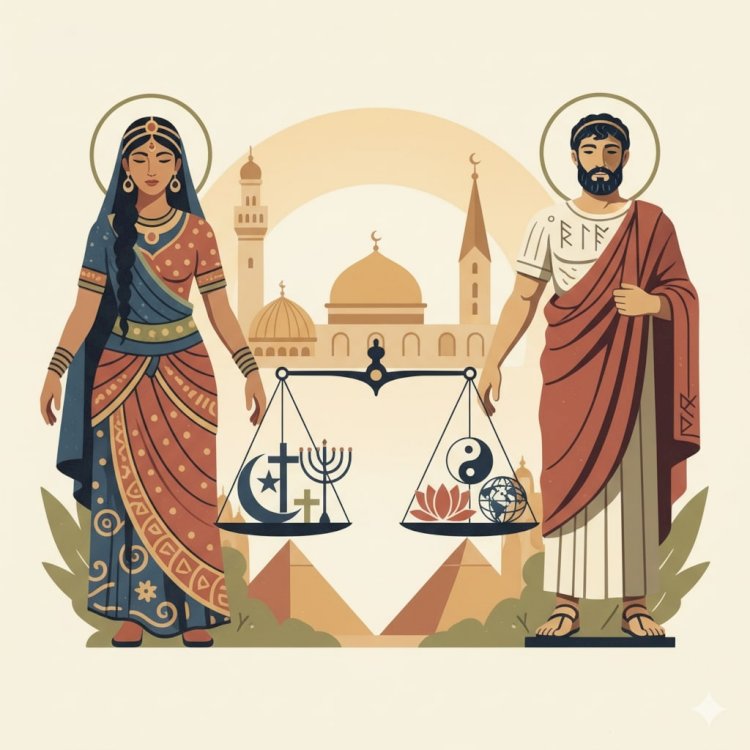The Law of Men and Women in Religions and Cultures

A complete and unambiguous rereading of inheritance, testimony, blood money, and social roles
By Dr. Pouyan Ghamari
The laws that are debated today concerning men and women did not begin with the Qur’an, nor are they exclusive to Islam. These laws existed thousands of years before Islam—in ancient Persia, Judaism, Christianity, India, China, Greece, and even among European tribes.
In all these civilizations, men received a larger share and women’s testimony was more limited. But the hidden point is this: none of these laws were written on the basis of human value. They were written on the basis of social roles.
Man worked outside the home—in war, in trade, and as the financial provider of the family.
Woman was the guardian of lineage and culture inside the home.
The law was written according to roles, not value.
When a role changes, the law must also change.
And this principle is not a modern interpretation—it is an ancient instruction.
In all sacred texts, the principle of the law’s adaptability is clearly stated.
A golden rule that explains everything
In every era, law is written according to the realities of society.
When the reality changes, the law must also change.
Neither the Qur’an nor the Torah nor the Gospel ever claimed that legal forms must remain fixed forever.
What is permanent is justice and human dignity.
Inheritance for men and women in religions and ancient civilizations
The Torah
In the Book of Numbers, chapter 27, the daughters of Zelophehad protested:
“We have no brothers. What happens to our father’s inheritance?”
God said to Moses: “They are right.”
Change the law.
This is the first religious document in history where an inheritance law is changed.
In the Torah, men received a larger share due to greater financial responsibility—
not greater value.
The Gospel
Christ clearly says in the Gospel of Matthew:
“I have come to fulfill the Law.”
To fulfill means to transform.
In Galatians it states that man and woman are equal.
But inheritance was carried out based on Roman law,
not on the basis of human worth.
Ancient Persia
In the Avesta, the son was the primary heir, but the woman possessed spiritual authority and internal decision-making power.
In Persian culture, woman was the center of fire, light, and life.
But the law of inheritance was written based on economic roles,
not spiritual worth.
India
In the Manu Smriti, the man received the larger share,
because man was the protector of the external world and woman the protector of the internal world.
Law followed role, not value.
China and Confucius
In China the son inherited more,
but woman was the spiritual pillar of the family and the soul of tradition.
Again, the principle was role, not value.
Europe and Greece
In Rome, the father was the legal owner.
In Athens, women had no right to vote or testify.
But these restrictions were never expressions of female worthlessness—
they were merely products of the social structures of those eras.
What does the Qur’an say?
The inheritance law in the Qur’an is precise and clear—but its reason is not value.
Its reason is the economic role of men during that historical period.
In Surah An-Nisa it says:
Yūṣīkum Allāhu fī awlādikum, lil-dhakari mithlu ḥaẓẓ al-unthayayn
The son receives twice the share.
But a few verses later it explains:
Ar-rijālu qawwāmūna ʿala an-nisāʾ bimā anfaqū
Men are maintainers because they were the financial providers—
not better,
not superior,
just financially responsible.
When financial responsibility changes,
the law must change.
This principle is recorded within the Qur’an itself.
The principle of legal change in the Qur’an
Surah Al-Ma’idah, verse 48:
Likullin jaʿalnā minkum shirʿatan wa minhājā
For every community and every era We have appointed a distinct law and a distinct path.
Meaning:
Law follows circumstances.
It is not fixed for all time.
The Qur’an itself announces the adaptability of rulings.
Social rulings are time-bound.
Ethical and monotheistic principles are permanent.
Why does the Qur’an mention the testimony of two women for one man?
Surah Al-Baqarah, verse 282, says that for commercial contracts, one male witness and two female witnesses are sufficient.
This ruling was only for commerce—
not for homicide,
not for divorce,
not for judicial matters,
not for other religious cases.
And the reason is clear:
women of that era were not active in trade.
To prevent mistakes and reduce psychological pressure, the law took this form.
So it was not based on value—
it was based on social experience.
Blood money (Diyah) for men and women
In all past civilizations, the blood money for a man was higher,
because the man was the financial provider.
If the man died, the financial structure of the family collapsed.
This law did not come from value,
but from role.
Today, roles have changed—
so blood money must be equal.
This is the logic of the religions themselves.
The equality code in the three Abrahamic faiths
Three key verses settle the entire discussion:
Qur’an — Surah Al-Hujurat, verse 13
Inna akramakum ʿinda Allāhi atqākum
The most honorable among you is the most conscious and righteous.
Torah — Book of Deuteronomy, chapter 6
God created the human being in His own image—
neither man is superior nor woman.
Gospel — Galatians 3:28
There is neither male nor female; they are one.
This means:
Human value is equal.
Social law follows role.
When the role changes, the law must change.
Why past laws cannot be applied today
Because today:
woman is a doctor,
a merchant,
a commander,
a CEO,
the financial provider of the family.
And man today may take on the role of caregiver or educator.
Roles have changed.
A law based on roles no longer holds logic when the roles themselves have transformed.
The view of metaphysics and nature
Man and woman are two poles of energy.
Woman is the energy of life.
Man is the energy of movement.
Power emerges from the combination of the two,
not from the superiority of one.
In the world of energy,
equality is the foundation,
balance is the foundation,
capacity is the foundation.
Final conclusion and the code for updating the law
Law is written based on role.
Value is based on the soul.
The souls of man and woman are equal.
Today their roles have changed—
therefore the law must change.
This is not against the Qur’an,
not against the Torah,
not against the Gospel,
not against philosophy,
not against metaphysics,
not against nature.
This continues the same ancient principle stated thousands of years ago:
Law must harmonize with time
so that justice remains sustainable.

 content-team
content-team 


















